What's it like to retire in Nicaragua?
John-Marc Gallagher - GPS Real Estate
Retirees in Nicaragua are having more fun than I do and probably their blood pressure is not as high as mine is, because it’s easy to retire here and it’s easy to live. It is harder to do business in Nicaragua but to retire is easy. Retirees are having the times of their lives. I honestly do not expect to retire but coming down here and just living the life in Nicaragua is so much simpler than my life trying to run several businesses and trying to manage hundreds of...
Retirees in Nicaragua are having more fun than I do and probably their blood pressure is not as high as mine is, because it’s easy to retire here and it’s easy to live. It is harder to do business in Nicaragua but to retire is easy. Retirees are having the times of their lives. I honestly do not expect to retire but coming down here and just living the life in Nicaragua is so much simpler than my life trying to run several businesses and trying to manage hundreds of employees. If you come to Nicaragua to retire, you are going to love it.
One of the many reasons why we appreciate living and retiring in Nicaragua is that we seem to be healthier. When I was still in the States 15 years ago, I have had a couple of surgeries. I probably spent $400 per month on medical insurance. I used my medical insurance for surgeries and medical needs.
In the last 15 years that I have been here in Nicaragua, I don’t think I have spent $5,000 in cash total for medical care between my wife, my 8-year old son, and myself because we eat healthier. It’s not all processed foods. When I buy chicken, the chicken was alive a week ago and it was not stuffed and injected with hormones to make it fat, juicy, and plump. Meat is fresh and it does not come from a feedlot that has been injecting steroids into the cows. Vegetables are fresh. Eggs are not refrigerated. We do not refrigerate eggs in Nicaragua. I haven’t eaten a refrigerated egg in 15 years, ever since I came here and yet I eat eggs three or four times a week. The eggs were laid on Monday (for example), and I can still eat them on Friday and they could probably last three to six weeks without refrigeration.
They say diet will keep you healthy. I am not trying to be healthier. It is just a residual side effect from changing my lifestyle and having the quality of life that perhaps I thought I was getting but was not really getting in the US.
Posted September 18, 2014
Immanuel Zerger - Solentiname Tours - Discover Nicaragua
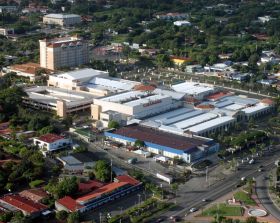 Retirement in Nicaragua is beautiful. You wake up with a sunny day and have your morning coffee. Everything is close by; you can go to the supermarkets and the groceries, which is just two blocks away. You can have lunch at home or eat at a restaurant nearby.
Retirement in Nicaragua is beautiful. You wake up with a sunny day and have your morning coffee. Everything is close by; you can go to the supermarkets and the groceries, which is just two blocks away. You can have lunch at home or eat at a restaurant nearby. There are many activities that you can do in Nicaragua. You can arrange some excursions with your neighbors. You can do some fitness activities, play golf, go for yoga lessons, learn Spanish, or go to...
 Retirement in Nicaragua is beautiful. You wake up with a sunny day and have your morning coffee. Everything is close by; you can go to the supermarkets and the groceries, which is just two blocks away. You can have lunch at home or eat at a restaurant nearby.
Retirement in Nicaragua is beautiful. You wake up with a sunny day and have your morning coffee. Everything is close by; you can go to the supermarkets and the groceries, which is just two blocks away. You can have lunch at home or eat at a restaurant nearby. There are many activities that you can do in Nicaragua. You can arrange some excursions with your neighbors. You can do some fitness activities, play golf, go for yoga lessons, learn Spanish, or go to a cinema. It all depends on what you want to do. You can have siesta (afternoon rest) after lunch, just like the locals do until 3 PM when it is not too hot anymore. Then you can have a nice dinner in the afternoon or early evening.
In Nicaragua, you can hire people inexpensively to help you with cleaning the house or to drive you around. Nicaraguans like it when they are able to help because they are friendly by nature.
Posted January 23, 2015
Esmerelda Vargas - Schuvar Tours
 Retiring in Nicaragua is to have a very relaxing life. You will have a beautiful environment and have a lot of friends.
Retiring in Nicaragua is to have a very relaxing life. You will have a beautiful environment and have a lot of friends. For instance, in San Juan Del Sur, expats there do exercises or yoga because there are yoga places over there. Maybe they can also have a small business, if they want to have something to do during the day. Depending on where they are, you can also go walking, you can fix your garden, or just meet new friends. Doing something for...
 Retiring in Nicaragua is to have a very relaxing life. You will have a beautiful environment and have a lot of friends.
Retiring in Nicaragua is to have a very relaxing life. You will have a beautiful environment and have a lot of friends. For instance, in San Juan Del Sur, expats there do exercises or yoga because there are yoga places over there. Maybe they can also have a small business, if they want to have something to do during the day. Depending on where they are, you can also go walking, you can fix your garden, or just meet new friends. Doing something for the community is also very good for expat retirees to do.
I didn’t mention Granada as nice retirement place because I like more natural places, but Granada has a lake and has its own beauty, but it is getting more crowded now. The colonial city of Granada is very nice, but for me, Granada is too crowded.
(Yoga pose, pictured.)
Posted April 30, 2015
Nica Dean
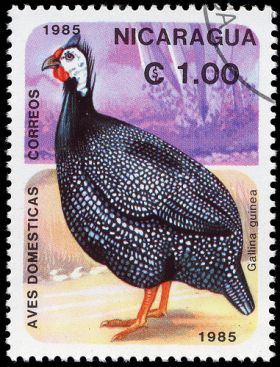 Well, seeing how the people so far that have responded have a bias, let's not leave out power blackouts, water shortages, slow internet, insects everywhere, heat, heat, oh did I forget to mention heat? Electricity so expensive you can't afford to use AC, except in your bedroom at night. Roosters crowing at all hours, dogs barking for what seems like hours, local neighbors that chum up to you so they can borrow everything you have, cheap but crowed busses. A capital city with no street...
Well, seeing how the people so far that have responded have a bias, let's not leave out power blackouts, water shortages, slow internet, insects everywhere, heat, heat, oh did I forget to mention heat? Electricity so expensive you can't afford to use AC, except in your bedroom at night. Roosters crowing at all hours, dogs barking for what seems like hours, local neighbors that chum up to you so they can borrow everything you have, cheap but crowed busses. A capital city with no street... Well, seeing how the people so far that have responded have a bias, let's not leave out power blackouts, water shortages, slow internet, insects everywhere, heat, heat, oh did I forget to mention heat? Electricity so expensive you can't afford to use AC, except in your bedroom at night. Roosters crowing at all hours, dogs barking for what seems like hours, local neighbors that chum up to you so they can borrow everything you have, cheap but crowed busses. A capital city with no street signs or addresses just directions...
Well, seeing how the people so far that have responded have a bias, let's not leave out power blackouts, water shortages, slow internet, insects everywhere, heat, heat, oh did I forget to mention heat? Electricity so expensive you can't afford to use AC, except in your bedroom at night. Roosters crowing at all hours, dogs barking for what seems like hours, local neighbors that chum up to you so they can borrow everything you have, cheap but crowed busses. A capital city with no street signs or addresses just directions... Hey I don't want to sound negative but someone that asks a question like that who doesn't speak Spanish who has never visited would most likely not be suitable or would bail out in the first 6 months, like most. Then this leaves all the BS to us locals whom have adapted. If you don't have enough income or need something to do, go somewhere else, this place is tough on all but the most hardy!
(A rooster stamp from Nicaragua, pictured.)
Posted May 2, 2015
Joseph Bowersmith
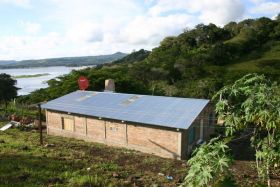 We live here in Jinotega, in the more mountainous, northern area of Nicaragua, and where there is not the larger concentration of expats that you can find elsewhere in the country. For me, retiring in Nicaragua is a love - hate relationship. I love the land. I collect and grow orchids and the mountains tend to have quite a few different orchids. I made it a habit to go out on my motorcycle whenever the electric company cuts down trees, so I can rescue the plants.
We live here in Jinotega, in the more mountainous, northern area of Nicaragua, and where there is not the larger concentration of expats that you can find elsewhere in the country. For me, retiring in Nicaragua is a love - hate relationship. I love the land. I collect and grow orchids and the mountains tend to have quite a few different orchids. I made it a habit to go out on my motorcycle whenever the electric company cuts down trees, so I can rescue the plants. ...
 We live here in Jinotega, in the more mountainous, northern area of Nicaragua, and where there is not the larger concentration of expats that you can find elsewhere in the country. For me, retiring in Nicaragua is a love - hate relationship. I love the land. I collect and grow orchids and the mountains tend to have quite a few different orchids. I made it a habit to go out on my motorcycle whenever the electric company cuts down trees, so I can rescue the plants.
We live here in Jinotega, in the more mountainous, northern area of Nicaragua, and where there is not the larger concentration of expats that you can find elsewhere in the country. For me, retiring in Nicaragua is a love - hate relationship. I love the land. I collect and grow orchids and the mountains tend to have quite a few different orchids. I made it a habit to go out on my motorcycle whenever the electric company cuts down trees, so I can rescue the plants. When we first came here, we didn't have people on the streets who are always begging or kids coming up to you and asking for money as a gift. Now, I don't hear the "gift to me" any more. It's just “give me, give me, and give me.” You can't go in to any of the stores that the expats would go to in Jinotega without being assaulted by these people outside who are constantly saying “give me money” when you come out.
It wasn't like that when we first came here to this area of Nicaragua. That has been more panhandling in the past 5 years. It's been sliding pretty much going downhill. I guess, we're seeing that there's less and less work available for people. There are more locals who are out of work here. And there is more happening in the way of thefts; neighbors telling us that something was stolen from their property or that somebody's going through their stuff and stealing things. When we first came down to Nicaragua, it wasn't like that. So crime has increased here and there is now more of a “hand-in-your-face give me something” going around.
(Home of Joseph Bowersmith in Jinotega, Nicaragua, with lake in teh background.)
Posted August 10, 2015
Darrell Bushnell
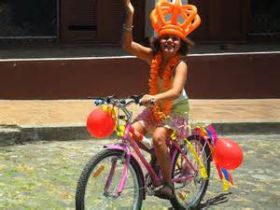 Compared to other places, you can live in Nicaragua very inexpensively. (You can live expensively, too.)
Compared to other places, you can live in Nicaragua very inexpensively. (You can live expensively, too.) What’s different about retiring in Nicaragua is that most people would not choose Nicaragua as one of their top 10 choices where they are going to live in the world. As a result, there is a lot of camaraderie between the expats here in that we are all strange enough that we all live in Nicaragua, and that gives us a common basis for...
 Compared to other places, you can live in Nicaragua very inexpensively. (You can live expensively, too.)
Compared to other places, you can live in Nicaragua very inexpensively. (You can live expensively, too.) What’s different about retiring in Nicaragua is that most people would not choose Nicaragua as one of their top 10 choices where they are going to live in the world. As a result, there is a lot of camaraderie between the expats here in that we are all strange enough that we all live in Nicaragua, and that gives us a common basis for friendships and other similar things.
We have never regretted moving here, and we enjoy it very, very much. What we always say is that it’s enough to be interesting but not different enough to be bizarre.
A common theme here in Nicaragua is “reinvention,” which I hear about a lot. Because of living longer you have so many years in retirement that we really never really retire. We’re as busy as we were in the States but we are doing what we wish to do. For example, my wife had never taught before, and here she teaches five days a week at her art studio gallery. She teaches painting, which has gotten very, very popular with the locals, the expats and the tourists. So she spends a great deal of time doing that. As for me, I never wrote before, and now down here I’m writing articles left and right. I have the website, which has gotten extremely popular. I started a community newsletter, which is pretty popular considering the small number of expats there are in this country. And then I’m involved with several foundations, the main one being Puedo Leer, where we built libraries.
It seems like the same the same experiences are true for a lot of our friends, too. They have picked up on something they’ve always wanted to do or maybe something they never had thought about doing or saw a niche they would enjoy and started doing it. I’m amazed at how many expats are writing books; not the bestsellers, but they do write.
(Riding her bike with a balloon crown, a De Springplank student, attending a school originally from the Netherlands in Managua, Nicaragua, pictured.)
Posted August 25, 2015
Jewel Hoff - Tierra de los Suenos
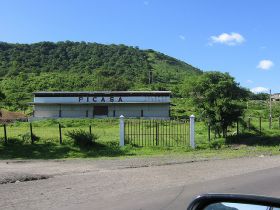 I don’t know what its like to retire in Nicaragua because I bought a farm. I’m retired at the moment but it takes a lot of work to build and fix up virgin land. From what I see from other expats I know, they absolutely love it.
I don’t know what its like to retire in Nicaragua because I bought a farm. I’m retired at the moment but it takes a lot of work to build and fix up virgin land. From what I see from other expats I know, they absolutely love it. Retiring in Nicaragua is stress-free. You lose 20 to 40 pounds in first 3 months because of the way you’re eating. Most retirees do not eat the American way here. We don’t even have a McDonald’s here,...
 I don’t know what its like to retire in Nicaragua because I bought a farm. I’m retired at the moment but it takes a lot of work to build and fix up virgin land. From what I see from other expats I know, they absolutely love it.
I don’t know what its like to retire in Nicaragua because I bought a farm. I’m retired at the moment but it takes a lot of work to build and fix up virgin land. From what I see from other expats I know, they absolutely love it. Retiring in Nicaragua is stress-free. You lose 20 to 40 pounds in first 3 months because of the way you’re eating. Most retirees do not eat the American way here. We don’t even have a McDonald’s here, even though we do have two or three pizza restaurants. Your eating habits change, so for retired people losing weight is such a big plus; their blood pressure goes down about 20 points. It’s just a healthier lifestyle—they do more walking than they do at home. In the US, retired people drive, while here, they walk. So it’s a healthier lifestyle.
The retired expats here in Nicaragua are happy, and they make new friends. They don’t tend to be reclusive. A lot of retired people end up being reclusive in the US. Here in Nicaragua, your neighbor’s family becomes your family. It’s just that way. It’s more of a community type environment than you have in the US.
Another good thing about retiring in Nicaragua is the cost of domestic help. For example, I fell off my horse recently here and I couldn’t help thinking what would have happened if I had fallen off my horse in the US. I have two housekeepers here and they doted on me 24 hours a day—all the way down to massages—and I was thinking to myself, “What if I was alone in Vegas and I just fallen off my horse? What the heck would I do?”
I was in bed for a whole week. If it wasn’t for these two ladies I probably would have gone to doctors and felt real sick, and alone. I firmly believe that your mental health has a lot to do with you physical health. I was in such pain that I couldn’t get out of bed. That was my whole left side; I couldn’t raise my elbow. I couldn’t drive my clutch car. It was that bad for a week. But if I was in the US I could see myself being really sick for months.
Part of my good mental health I got from my girls who looked after me. To have 24-hour care, including cooking for you and doing everything for you in the US would be at least a thousand a week, if not more. Here in Nicaragua, it cost me US $200 a month for both girls. You cannot be really rich in the US, but here, you’re wealthy. It takes the stress away and as you take the stress away you gain health. That’s why the blood pressure goes down and you get the weight loss as well because you’re not stressing and eating all the time. You’re busy walking, seeing things, and talking to people.
(Road to Matagalpa, Nicaragua. pictured.)
Posted September 17, 2015


